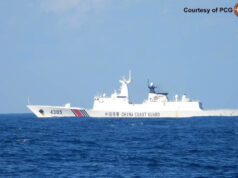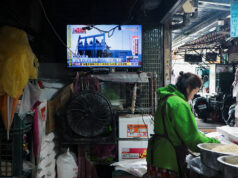Inflation could have topped 5% in May
By Melissa Luz T. Lopez
Senior Reporter
INFLATION likely picked up further last month as oil and rice prices kept rising, the Bangko Sentral ng Pilipinas (BSP) said on Thursday.
Prices of basic goods and services may have surged by 4.6-5.4% in May, which would meant a steady ascent for the fifth straight month.
The estimate range meant that inflation will be higher than April’s 4.5% — already the highest rate seen in at least five years — and from the 2.9% clocked in May last year using 2012 prices.
This also meant that year-to-date inflation will remain above the 2-4% 2018 target range of the central bank.
The Philippine Statistics Authority is scheduled to release latest inflation data on Tuesday.
“Higher domestic petroleum prices amid geopolitical tensions in the Middle East as well as the sustained increase in rice prices present upward price pressures for the month,” the BSP Department of Economic Research said in a statement on Thursday.
Rice prices have been rising since April due to low stocks in National Food Authority warehouses.
Fuel companies also announced three waves of increases for retail pump prices in May, reflecting movements in global crude and a weaker peso-dollar exchange rate.
Oil prices surged to three-year highs earlier last month amid fears tensions between the United States and Iran could affect global supply. As a result, pump prices have risen by P6.70 per liter for gasoline, P7.30/liter for diesel and P6.85/liter for kerosene as of May 22, according to the Department of Energy.
Several lawmakers want to halt implementation of Republic Act No. 10963, or the Tax Reform for Acceleration and Inclusion Act that took effect on Jan. 1, in order to temper inflation as the law raised the excise tax on gasoline by P7/liter and on diesel by P2.50/liter since Jan. 1. The new tax law carries a provision that will suspend the fuel excise tax, but only if Dubai crude oil — which is used as benchmark for local prices — averages $80 per barrel or higher before another round of tax increases kick in. The Finance department has attributed the spike in petroleum prices to rising global oil prices and the peso’s depreciation, rather than higher excise taxes.
On the flip side, the BSP said lower electricity tariffs coupled with declines in the cost of fruits and fish would “partly offset” price spikes for other commodities. Food costs have declined as supply of these crops normalized in April, the central bank added.
Power distributor Manila Electric Co. said utility rates dropped by P0.5436 per kilowatt-hour in May due to a lower generation charge.
“Going forward, the BSP will remain watchful of evolving price trends and ensure that the monetary policy stance remains appropriate to maintain price stability that is conducive to a balanced and sustainable economic growth,” the central bank said.
Inflation has averaged 4.1% as of end-April.
The central bank has conceded to missing its inflation target for 2018 as latest estimates showed that the full-year pace will average 4.6%.
BSP Deputy Governor Diwa C. Guinigundo previously said that inflation will pick up further and peak “towards the end of 2018.”
At the same time, he noted that the 25-basis-point interest rate hike announced by the central bank on May 10 — the first in nearly four years — appears to be enough to ease future price increases and bring the inflation rate back to target range by next year.



